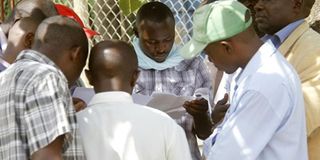Families check corpses to pick out their dead

Searching. Relatives of some of the deceased check on the list for the names of their loved ones killed in Kasese District. PHOTO BY ABUBAKER LUBOWA
What you need to know:
- Mr Kaweesi maintained that only 62 people had been killed during the attacks despite constant reports suggesting a figure higher than 100.
- By press time, 19 bodies, among them that of 16 police officers, had been identified.
Kasese. Over the past five days, Ms Betty Mbambu had been pregnant with grief and anxiety. She wished away the pesky thought that her 17-year-old son, Cramina Muhindo, could have been killed during the November 26, 2016 military raid on Buhikirwa Palace. But why?
He was just a man herding Rwenzururu king Charles Wesley Mumbere’s livestock, she said.
However, that changed yesterday. When police released the list of suspects they have taken into custody since the weekend, Muhindo was missing.
With the hope of ever seeing her son alive faded, Ms Mbambu like hundreds of Rwenzori region residents anxious about whereabouts of their missing relatives, paced up to Kasese Municipal Health Centre to explore if her son’s body could be among corpses that police were handing out.
In groups of 10, police officers ushered in the relatives to go and inspect the dead bodies in the morgue. Others soberly and silently endured the putrid stench at the hospital as they waited for an opportunity to check the bodies in black gunny sacks.
Ms Mbambu was told to wait. She did. Mr Muhindo’s body, if not at the municipal health centre, could be at a hospital in neighbouring districts, she thought. Tears coursed down her cheeks.
She kept a vigil at the health centre and by press time, last evening, she was waiting to see if her son’s body might be among others being transferred back to Kasese from neighbouring Kabarole District where they were moved for storage when local health facilities were overwhelmed.
Next to Ms Mbambu was Alice Biira who waited in vain for her husband, Mr Gideon Bwambale, a Rwenzururu Kingdom royal guard to return home after the raids. He did not return and the waiting was on the wall. Something ominous had likely happened.
Like Ms Mambu, Ms Biira could neither trace her husband’s name on the list of those detained nor at the mortuary.
She too camped at the health centre, anxious to break whatever news to her co-wife and their 13 children. Mr Bwambale’s third wife too was not on the police list of detainees.

Worried. A man waits for the bodies of his relatives at police. PHOTO BY ABUBAKER LUBOWA
She suspects she could have been killed with their husband during the raid on the palace where they both worked.
The smell and shape of the decaying bodies made it impossible for Peter Baluku, a resident of Kigoro, Rukoki Sub-county to identify his 30-year-old son Morris Bwambale Sikulimunyu. By the time our reporter left the mortuary, he had summoned other relatives to help him identify his son.
For Batilimao Masereka, a resident of Buhawura in Rukoki Sub-county, finding one of his sons Alikangiro Masereka, a teacher, on the list of detainees was both worrying and a relief. At least he was not dead. But Masereka’s second son, Michael Bwambale, remains missing.
He says his son, a teacher at Kiruru Primary School, visited the palace for the meeting but was caught up in the army and police raid.
Police spokesperson Andrew Felix Kaweesi yesterday refuted claims that non-combatants had been caught up and possibly killed in the raid.
On surrendering
“There was time given to the palace officials, including the king, to hand over these militias and that was not one hour, not two hours. We think any reasonable person who was not part of those militias could not have dared to be there and, in any case, if he or she was there and did not take logic to get out, he or she took a higher risk,” he said.
Mr Kaweesi maintained that only 62 people had been killed during the attacks despite constant reports suggesting a figure higher than 100.
He, however, appealed to the community to inform the police in case they recover a body that the security forces are unaware of.
“There should be no speculation in regards to this,” Mr Kaweesi said after warning sections of the media against what he termed as quoting his juniors.
Mr Kaweesi said the government would not provide any help to the deceased except the security operatives who were killed.
“Please, we are not responsible for those compassionate calls. These people if they were alive, they would be criminals,” he said.
By press time, 19 bodies, among them that of 16 police officers, had been identified.




